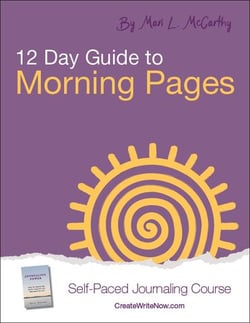Guest Blog Post by Mariana Ashley
 Most people I know stray from the idea of stream of consciousness (SOC) writing because they equate it with an elevated literary league which they could never practically reach. While it is true that SOC is embedded in the history of literary greats such as William Faulkner, Virginia Woolf, and James Joyce, I also believe that it is still accessible to the everyday person.
Most people I know stray from the idea of stream of consciousness (SOC) writing because they equate it with an elevated literary league which they could never practically reach. While it is true that SOC is embedded in the history of literary greats such as William Faulkner, Virginia Woolf, and James Joyce, I also believe that it is still accessible to the everyday person.
What Is It?
The earliest and most authoritative examples of SOC writing came from classic literary authors using a distinctive style to emulate a character’s thought process; they would often utilize leaps in syntax and punctuation among other stylistic liberties, but this is not a requirement. SOC style can be surmised as simply the written equivalent of a person’s thought process. The best way to achieve this is to simply have a continuous flow of thoughts, feelings, memories, and perceptions.
How You Can Write in SOC Style
Remember that you don’t have to be held to the standards of literary giants. Literally all you need to do is:
• Write without breaks for a set period of time.
• Do not slow down or edit while writing.
The whole purpose of this style of journal writing is intended to break down subconscious barriers that would otherwise hinder your free flow of thought on paper. You can also try to begin writing from a specific focus point, but I wouldn’t try too hard to navigate that topic throughout the writing session; if you really want to write a focused entry on a specified topic, SOC style should not be your first choice.
As for how long your set period of writing time should be, it will probably vary from person to person. Some may be as short as ten minutes or as long as an hour. If you are having issues starting these sessions (your mind is blank or you feel like your writing material is useless), I suggest trying SOC writing in short 10 minute or less intervals. Eventually, you may encounter a SOC session that you will want to continue beyond your set interval. Go for it! This is the golden SOC moment you are trying to achieve.
Why Should You Try SOC Writing?
There are a variety of benefits to SOC writing, many of which lend greatly to journal writing. The greatest benefits of SOC writing include the following:
1. No barrier of entry. Despite the literary tradition behind SOC style, there is no reason to feel any sort of anxiety when trying your first SOC session. You don’t have to cater to a specific purpose and the entry doesn’t have to live up to any expectations. It is simply supposed to reflect the current state and focus of your mind and consciousness. There is no pressure.
2. Can easily produce a lot of material. I know that, for journal writing, quantity is not everything. But still, having more material in your journal is never a bad thing. I’ve had SOC sessions easily sprawl through pages of my notebook before even realizing it.
3. Can easily produce surprising material. More important than creating more material, SOC writing may introduce thoughts and ideas you didn’t even know you had. This free-flow type of writing is perfect for coming across unexpected revelations and observations.
4. Gives you ideas for future entries. Because you can unpack so much unexpected subconscious thought and feelings, you are often left with a lot of leftover, yet-to-be-explored material that you can then critically examine in future entries. Because of this fact, I strongly recommend giving a good read over your SOC entries once they are written; you may come across something you didn’t even remember writing.
Bottom LineHaving a free-flowing writing session can really help the guidance and direction of your journal writing. While not every entry should be as free and directionless as a SOC session, utilizing them every week or so is never a bad idea. It will help keep your journaling into the larger perspective of your greater subconscious.
About the Author
Mariana Ashley is a freelance writer who particularly enjoys writing about online colleges. She loves receiving reader feedback, which can be directed to mariana.ashley031@gmail.com.
If you want to learn how journaling can help you tackle life's challenges, please download the free eBook, The Journaling Guide to Manage The Stress and Strains of Life.
Creating a daily Morning Pages journaling habit can be the first step in changing your life. Our 12 Day Guide to Morning Pages self-paced course is the perfect tool to get you started on your journey.



Leave Comment